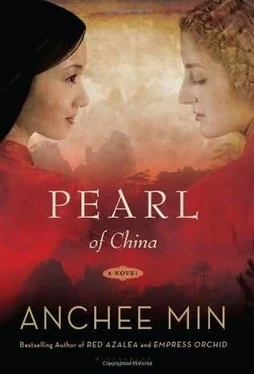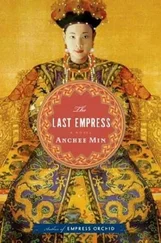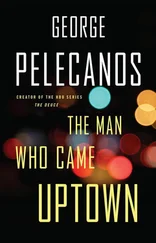However, Rouge was confident. She wrote letters to important people and made personal visits to the governor’s office, the police bureau, and the passport agency. She didn’t hesitate to play the role of the Communist Party boss that she was.
“Willow Yee’s trip to America will build a bridge between China and America,” Rouge insisted. “Chin-kiang strives to be a model town when carrying out Deng Xiaoping’s new foreign policy. Willow Yee is a loyal citizen whose only motive is to serve her country. As the party leader, I suggest that we make use of her before she expires.”
I went to Carie’s grave and collected a bag of dirt before my departure for America. I packed the bag next to my medicines in my suitcase. Although I suffered only age-related stiffness, the doctors were worried. They didn’t trust that I was fit to travel long distances.
I knew I would make the trip easily. I had been living my life to see Pearl one last time. Rouge was concerned that the American consulate wouldn’t grant me a visa due to my age. She was right. The consul requested proof of health insurance. We didn’t understand what “insurance” meant and had never heard of it. The consul suggested that we purchase a temporary policy for traveling in America. When Rouge received the estimated cost, she was stunned. “The cost of a three-month insurance policy is more than a Chinese person earns in ten years!”
Like Papa, Rouge felt no guilt about taking risks. She redoubled her efforts and pulled strings. She located Dick’s former prisonmate, General Chu, who not only was the new head of the national congress but also knew the American consul general himself. My visa was instantly granted. While Rouge confirmed the last details of my trip, I walked the hills, with the help of my grandchildren, where Pearl and I had once played. My legs were shaky, but I was happy.
I didn’t have to imagine Pearl’s American home, because Rouge showed me the photos sent by the Sino-American Friendship Association. It was beautiful. The place was a complex of houses against green rolling hills and blue sky. I couldn’t wait to see the interior. I imagined the rooms filled with tasteful furniture and decorated with Western art. Pearl would have a library, for she had always been a lover of books. I also imagined that she would have a garden. She had inherited Carie’s passion for nature. The garden would be filled with plants whose names I wouldn’t know, but it would be beautiful.
Where would she lie? I wondered. Growing up in Chin-kiang, she was familiar with the concept of feng shui. But would she apply the concept to her own resting place? After all, she had lived in America as long as she had in China. I wondered what her grave would look like. What would she surround herself with? Would she have a tombstone? Would there be carvings on the stone?
I intended to conduct a little ceremony after I arrived. I would light incense handmade by her friends in Chin-kiang. I would then spread the soil collected from her mother’s grave on her grave. I wanted to see the spirits of Carie and Pearl reunited. It would make me happy if I could accomplish only that.
In Washington, D.C., the Chinese consul, a handsome young man dressed in a Western suit, was upset with me. He had a television crew waiting to document my journey, but I insisted on going alone.
It took a few days for the consul to accept my terms. He bought me a train ticket to Philadelphia. He told me that he had also made a reservation for me at a local inn. I was excited and nervous. I could barely sit still after I got on the train. The landscape passing my window fascinated me. Springtime in America seemed to carry a more masculine yang element than southern China’s feminine yin. America’s mountains and trees were in contrast to Chin-kiang’s rolling bamboo-covered hills and swaying willows. If I were to describe the landscape using a Chinese brush, I would paint America with big strokes and splashes of ink, and I would paint China with hair-thin lines in elaborate detail.
I kept thinking of the time Pearl told me about her first trip to America. She was shocked that not everyone had black hair. She was fascinated at the different-colored people. She had never considered that she was not Chinese until that moment.
I wondered what it had been like for her to return to America and to be with her own people. Except for her face and the color of her hair, she was a complete foreigner. Beneath her skin, she was Chinese. I wondered how she had changed from the Pearl I had known and what she had looked like after she had grown old.
The old lady sitting opposite me had a petite figure. She was fair-skinned with blonde hair. Had Pearl looked like her when she was older? What did my friend have to change about her Chinese self to fit in to American society? It was possible for her to change her tone of voice, but what about her tastes and views that she had formed in China as a child, a teen, and an adult? Pearl once said that she felt enriched, like she owned more than one world. I liked that idea and envied her.
The moment I checked in to the inn, I received a phone call from the Chinese consul. He wanted to make sure that everything was going well. He suggested that I rest and visit the Pearl Buck House the next morning. I thanked him and said that I couldn’t wait. He then suggested that I leave my luggage at the inn. Over the phone, the consul admitted that he was a fan of Pearl Buck, and that he believed that Pearl had honored the Chinese people. He felt terrible about Madame Mao using her influence to have Pearl’s request for a Chinese visa rejected. “Madame Mao was a mad dog,” he concluded.
The consul told me that he had learned from American books and newspapers that Pearl had been wearing a brightly colored, embroidered Chinese robe prior to her death.
“It was said that for weeks Pearl sat in a large chair facing east staring out her window,” he said. “I wonder if what she was looking at is still there. I am curious about the final image she was seeing.”
What had she been thinking? I wanted to know too. Would it be thoughts of her childhood? Would I be in them? To survive, I had been escaping into my past for decades. I often recalled the popcorn man, the way Pearl pushed and pulled the bellows while I rotated the cannon. It was easy to close my eyes and see a vivid image of the popcorn man putting his dirt-colored cotton bag over the cannon while Pearl and I covered our ears. The big bang was always real and loud to my ears. I could even imagine the smell of the delicious popped corn and see Pearl’s smile as we stuffed handfuls into our mouths.
***
It was late afternoon when I first stepped inside the Pearl Buck House. I stopped just inside the door and examined the space. The room was exactly as I had imagined it. Friendly Caucasian women greeted me. They seemed to be accustomed to receiving non-English-speaking visitors. They suggested that I join the last house tour of the day. I was led to what was called the “Chinese view.”
I held my breath, afraid that it would vanish.
I could no longer hear what the guide was saying. It sounded faraway. I was in shock. The view on the other side of the glass looked like Chin-kiang. I felt like I had stepped into one of my dreams.
There was a gemlike pond cradled by rolling hills. White clouds drifted across the blue sky. Oriental maple trees stood by the pond like giant brown mushrooms. Mandarin ducks waddled about. Baby ducks followed their mothers and played in the water.
Like Carie, who had created an American garden in the middle of Chin-kiang, Pearl had created a Chinese garden around her American home. I remembered Carie’s struggle in growing American roses and dogwood. She helped the plants adapt to the southern Chinese climate and had to fight fungus and diseases. Carie’s roses would produce buds but no flowers. She used soap water and vinegar to kill the bugs and she composted her own soil with wood chips. She held a garden show when her roses finally bloomed.
Читать дальше












